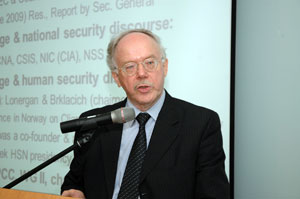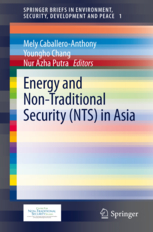Seminar cum Book Launch on 'Sustainable Development and the Nexus between Energy Security and Climate Change'
Date: 30 November 2012 (Friday)
Time: 2.30 – 4pm
Venue: RSIS, Nanyang Technological University (NTU), Nanyang Avenue, Block S3.1, Level B3 (New Wing), Seminar Room 2
Speaker: PD Dr Hans Günter Brauch (Fellow at the Institute on Environment and Human Security of the United Nations University, Adjunct Professor (Privatdozent) at the Free University of Berlin, Editor, SpringerBriefs series on Environment, Security, Development and Peace [ESDP])
Chairperson: Assoc. Prof. Mely Caballero-Anthony (Head, Centre for NTS Studies, RSIS, NTU)

Introduction
This seminar on ‘Business-as-Usual vs. Sustainability Transition in the Context of the Nexus between Climate Change and Energy Security’ was presented in conjunction with the launch of Volumes 1 and 2 of the SpringerBriefs series on Environment, Security, Development and Peace: Energy and Non-Traditional Security (NTS) in Asia and Rethinking Energy Security in Asia: A Non-Traditional View of Human Security (ed. by Mely Caballero-Anthony, Youngho Chang and Nur Azha Putra).
Energy security is closely related to climate change. Economic development requires energy, the consumption of which leads to higher greenhouse gas (GHG) emissions. Given the security threats posed by climate change, decarbonisation of the energy sector could contribute significantly to efforts to deal with climate change.
This presentation reviewed the global effort to tackle climate change effects and the research and debates that have defined efforts to address climate changes. It also highlighted the necessity of transitioning to sustainable development and the role of renewable energy in this process.
Presentation
 Climate change was brought to the attention of the international policy community more than 30 years ago. The global effort to deal with climate change is marked by several major points: the publication of the Brundtland Report in 1987; the convening of the Earth Summit in 1992 which culminated with the creation of the UN Framework Convention on Climate Change (UNFCCC); the Kyoto Protocol in 1997; and the latest Earth Summit, formally known as the UN Conference on Sustainable Development, in 2012. These events and the associated international conventions and treaties constitute the international framework for dealing with climate-related issues.
Climate change was brought to the attention of the international policy community more than 30 years ago. The global effort to deal with climate change is marked by several major points: the publication of the Brundtland Report in 1987; the convening of the Earth Summit in 1992 which culminated with the creation of the UN Framework Convention on Climate Change (UNFCCC); the Kyoto Protocol in 1997; and the latest Earth Summit, formally known as the UN Conference on Sustainable Development, in 2012. These events and the associated international conventions and treaties constitute the international framework for dealing with climate-related issues.
The securitisation of climate change has been based on physical and societal effects as well as the range of impacts of climate change. Physical effects include temperature increase, sea level rise, changing precipitation and natural disasters. Many of these effects pose existential threats to countries vulnerable to climate change. Bangladesh, for example, could lose part of its territory to the sea level rise.
Societal effects include forced migration, competition for resources and conflicts. These have been a big concern in both policy and academic communities as they present potentially grave threats to human security
Climate change also has a range of possible impacts that vary according to specific contexts. Climate change-induced natural disasters have increasingly affected megacities. With their huge populations and vibrant economic activities, these cities are particularly vulnerable. For instance, the flooding in Thailand in 2011 seriously disrupted the production chain of electronic devices. Changes in precipitation also have severe consequences for agricultural production, threatening food security.
Given that the extent and range of the impacts of climate change usually go beyond a single country, there is a need for the international community to tackle it jointly. However, the existing framework has failed to meet the expected targets due to the complexities of coming to a global consensus. For instance, the UNFCCC has no agreement on specific time frames for achieving set targets and the Kyoto Protocol does not have the commitment of major emerging economies. Moreover, the Kyoto Protocol is set to expire by the end of 2012, and countries have to negotiate a successor agreement. Often, because countries understand their responsibilities differently, climate negotiations come to a deadlock.
European countries have made a serious commitment to reduce GHG emissions. On 15 December 2011, the European Commission released its Energy Roadmap 2050. The European Union is committed to reducing its GHG emissions to 80–95 per cent below 1990 levels by 2050. In the Roadmap, the Commission explores the challenges involved in delivering the EU’s decarbonisation objective while at the same time ensuring security of energy supply and competitiveness.
The challenges arising from climate change are urgent. At present, the target of keeping temperature increase to less than 2 degrees Centigrade appears unlikely to be realised, which means that the probability of ‘dangerous climate change’ increases dramatically, with serious security consequences.
As a response, in 2005, a discourse emphasising ‘transitions to sustainable and resilient development’ emerged. It focuses on ‘long-term transformative change’ and resilient societies through the development and application of advanced science and technology to reduce the human footprint on the environment, particularly in the energy sector.
This transition can proceed through top-down efforts by the state, such as encouraging the use of renewable energy through legislation and cooperation between countries in renewable energy trade. It can also be promoted from the bottom-up through investment in renewable energy by the private sector.
Fossil fuels remain the primary energy source in the current global energy mix and their consumption is projected to increase. The energy sector is a major cause of GHG increases and it is thus important to transform the consumption pattern in this sector. Otherwise, competition over access to fossil fuels will possibly result in conflicts. Moreover, if effects of climate change are not effectively tackled, countries will also face other non-traditional security (NTS) threats, such as food insecurity, water shortage and natural disasters. Hence, it is important to shift from fossil fuels to renewables, and encourage cooperation in energy trade.
Discussion
The choice of strategy for coping with climate change largely depends on the capability of the country. Developed countries such as Germany are able to subsidise the development of renewable energy. However, some developing countries may experience difficulties. For example, those experiencing climate change-induced water insecurity may not have enough money to import safe drinking water for its population.
Climate change-induced NTS challenges also have a negative effect on human activity. Again, the choice of strategy varies. Those with the knowledge and capability to cope with the change may choose to adapt to the new environment, while those not able to adapt choose to migrate.
Renewable energy resources are regarded as a promising alternative to fossil fuels. Countries vary in their potential for developing renewable energy. For instance, countries in the Mekong River valley have the advantage of being able to exploit hydropower. Moreover, countries in that area can meet energy demand through electricity trade with other countries in the same area. Australia can develop solar energy, but it is not likely to trade solar-powered electricity because of its isolated geographic location. Wind and tidal power are still not widely used.
The cost of renewable energy is still typically higher than fossils, so it is essential to make these energy sources competitive in price. Technological advances can help reduce the costs involved, and is thus crucial for expanding use of renewable energy. Improvements in energy efficiency could also help reduce consumption and thus curb GHG emissions.
However, converting technological advancements into substantial progress in energy use depends on communication between the research community and policymakers as, in many cases, political will is needed to deploy the technologies. Public awareness is also important in achieving the transition to sustainable development. Changes in lifestyle and daily energy use could lead to greater energy efficiency. The urgency of climate change must thus be impressed on the public.
The acceleration of climate change is largely attributable to rapid human development in the past two centuries. The traditional development pattern relies heavily on energy consumption to sustain economic growth, which has consequently caused serious impacts on the climate and environment. Sustainable development stands for a departure from the old way and the prospect of a lessening of human impact on climate.
About the Books:
Traditional notions of security are premised on the primacy of state security. In relation to energy security, traditional policy thinking has focused on ensuring supply without much emphasis on socioeconomic and environmental impacts. Non-traditional security (NTS) scholars argue that threats to human security have become increasingly prominent since the end of the Cold War, and that it is thus critical to adopt a holistic and multidisciplinary approach in addressing rising energy needs. These books represent the perspectives of scholars from across Asia, looking at diverse aspects of energy security through a non-traditional security lens. The issues covered include environmental and socioeconomic impacts, the role of the market, the role of civil society, energy sustainability and policy trends in the ASEAN region.
|
SpringerBriefs in Environment, Security, Development and Peace (ESDP)
Vol. 1: Energy and Non-Traditional Security (NTS) in Asia
Vol. 2: Rethinking Energy Security in Asia: A Non-Traditional View of Human Security
Editors
Mely Caballero-Anthony
Youngho Chang
Nur Azha Putra
|

|

|
About the Speaker:
Hans Günter Brauch is Adjunct Professor (Privatdozent) at the Faculty of Political Science and Social Sciences, Free University of Berlin, and Fellow of the Institute for Environment and Human Security of the United Nations University (UNU-EHS) in Bonn. He was guest professor of international relations at the universities of Frankfurt on Main, Leipzig and Greifswald. From 1976–1989, he was Research Associate at Heidelberg and Stuttgart universities, Research Fellow at Harvard and Stanford University, and he also taught at the universities of Darmstadt, Tübingen, Stuttgart and Heidelberg.
He is Editor of three peer-reviewed book series published by Springer-Verlag: the Hexagon Series on Human and Environmental Security and Peace (HESP), SpringerBriefs in Environment, Security, Development and Peace (ESDP), and SpringerBriefs in Pioneers in Science and Practice (PSP).
He recently co-edited the following: Security and Environment in the Mediterranean (2003), Globalization and Environmental Challenges (2008), Facing Global Environmental Change (2009), Coping with Global Environmental Change, Disasters and Security (2011), and Climate Change, Human Security and Violent Conflict: Challenges for Societal Stability (2012).
Click here for the programme.
Posted on: 30/11/2012 2:30:00 PM |
Topic: Energy Security


